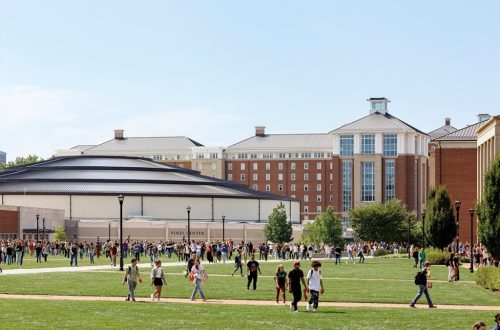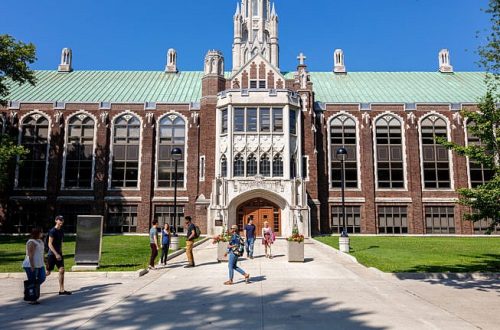How To Get Into Johns Hopkins University
Maryland Johns Hopkins University is a top school in Baltimore. Johns Hopkins is a great school for students who put in the work during high school. It can be difficult to get into Johns Hopkins. To be considered a strong candidate, you must have the right combination in test scores, grades, extracurricular activities, and other factors. To give you the best chance of getting into Johns Hopkins, this article will explain everything you need. Let’s start by discussing how to apply for Johns Hopkins University.
How easy is it for Johns Hopkins to get in?
Johns Hopkins University’s selection process has been more competitive than other schools over the years. Due to the pandemic, many students have delayed college. However, all applicants are competing for the same number places in the freshman class. Johns Hopkins accepted 15% of applicants three years ago. That is very low. Johns Hopkins has an acceptance ratio of 11.1% at the moment, which is higher than Ivy League schools. However, it can be less selective in certain cases.
Johns Hopkins received 32.231 undergraduate application for the class 2025. Johns Hopkins accepted around 1,300 students, which is a sign of how selective they are. Applying early is a good idea if Johns Hopkins has been chosen as your top school.
There are several factors you need to take into consideration when applying for Johns Hopkins. First, you need to decide whether or not you want to apply for early decision. Johns Hopkins has a strong reputation for acceptance. Early decision applicants have a higher acceptance rate than those who apply cumulatively at 11%. Bottom line: Apply early if you’re certain Johns Hopkins is right for you.
Johns Hopkins wants to know what applicants are like.
We’ll break down the criteria Johns Hopkins uses to evaluate your application in order to provide you with the most accurate information. Johns Hopkins says that while some factors are very important, others are also considered in the application process. However, they are less influential.
Johns Hopkins is very particular about your test scores and transcript. However, they also consider other factors like academic character, leadership and impact.
GPA
Johns Hopkins, a nationally renowned research institution, has been making it more difficult to gain admission. Johns Hopkins does have no set benchmarks, but applicants need to meet a number other criteria. Johns Hopkins does NOT publish the average GPA among their admitted applicants. However, it can be assumed that a minimum of 4.0 GPA is required. You will need to find ways to improve your GPA if it is below 4.0.
High school students will need to be able to handle a demanding course load. This includes IB, AP, honors and IB classes. You can present Johns Hopkins with a remarkable GPA by getting great grades in these classes. But it does more. Johns Hopkins considers class rigor to be the first important factor.
Johns Hopkins wants to see that you are a high-achieving student. This shows academic integrity and intellectual curiosity. Johns Hopkins is looking for students who are committed to their education and will take challenging courses in highschool to show that they intend to push themselves in college.
Colleges are attracted to students who have made significant improvements in their grades throughout high school. However, Johns Hopkins is a selective school that wants to see evidence of your commitment to academic excellence all through high school. They want to see hard work and intellectual curiosity. This shows they value students who are willing to take more challenging courses.
Test scores
During the 2022-2023 application cycle, standardized test scores were not required. However, this could change in the future. This is why you should be prepared for the SATs/ACTs to get as high a score as possible. Johns Hopkins applicants were typically able to score between 1520-1560 on SATs and 34-35 on ACTs.
It is common to believe that to be admitted to top schools, you must have a certain score. Johns Hopkins 1520 was a median score. This meant that students could have scored lower or higher than the average. You are not judged solely on your test scores. However, applicants with lower scores will often need to make up the difference somewhere else in their application.
Pursuits outside of school.
Colleges are looking for well-rounded students with a passion for life beyond the classroom. They want to know how you spent your time. Extracurricular activities are a great way to show leadership and community commitment.
Schools care less about the activities you did rather than the way you did them. Did you ever take on new ideas or projects when you were involved with community service? What lessons can you draw from your experience working part-time at a job that took up a lot of your time and how can you make more of your work time?
What role did you play in your sport’s leadership? You might have taken it upon yourself and started a social justice group at school. Or you solved a particular problem in your neighborhood. Whatever your past experiences, Johns Hopkins hopes to see you grow intellectually and personally.
Some students are so focused on their chosen field that they spend their free time exploring their academic interests. These pursuits are not considered academic. However, they can still be considered extracurricular. Perhaps you spent the summer exploring Geology with researchers at Moab Park. You might have turned your passion for medicine into a career in the field of infectious disease research. Johns Hopkins welcomes your involvement in any area of interest.
Johns Hopkins believes that extracurricular activities should be written about. What impact has your activity had on your local community? How did your community respond to you taking on this initiative?
Scholarly investigation
Johns Hopkins admits students who have participated in research. Johns Hopkins is well-known for its research capabilities. Many of their academic programs are research-oriented, and they have many research opportunities in their departments.
Johns Hopkins states that they are America’s first university for research. They have been finding answers to difficult questions since 1876. No matter what major you choose, all students here are investigators. Our undergraduates do research at a level not available to professionals or students at other schools. This allows them to make connections and contribute to new knowledge.
Johns Hopkins offers students a range of resources in addition to their research philosophy. Students enrolled in the college of art and sciences can use the Office of Undergraduate Research, Scholarly and Creative Activity to plan, launch, and manage their research projects. The Hopkins Office of Undergraduate Research is a resource that helps students find research opportunities on campus and elsewhere. Johns Hopkins also hosts an annual DREAMS celebration to recognize undergraduate research, scholarship, creative projects.
What is Johns Hopkins looking for?
Johns Hopkins has a three-part approach to what they want. Johns Hopkins seeks students with academic character and academic impact, as well as personal contributions. These three elements are what Johns Hopkins means.
Academic Character "How can I show my academic passions?" What is most important? We will look at your transcripts. Testing results are also important.
Impact and initiative – "Our undergraduates make a difference on campus and in the community." Students are encouraged to consider how they can make an impact through leadership, service, and innovation. To assess the commitments made outside of school, the admissions committee examines applicants’ extracurricular activities.
Personal contributions – "How can you interact with your community, academic, personal, or social?" What are the qualities you have that would make your campus a good fit? We are looking to recruit students who are interested in pursuing their college passions and who are open to joining our campus community.
Johns Hopkins seeks academic passions in addition to how they can be applied to their real-world experiences.
Personal statement/supplemental essays
Top schools demand more than just a transcript. Johns Hopkins is interested in your thinking and expression. A school doesn’t know how you think, and numbers on your transcript won’t tell them. This is why it is so important to use your personal statement as well as your supplemental essays in your application. Johns Hopkins undergraduate admissions personnel need to know that Johns Hopkins students are looking for ways to get in.
Johns Hopkins is a school that welcomes students with excellent grades and high test scores. You must be different from others to get through the application process. Johns Hopkins seeks intelligent, hardworking, and interesting students. Johns Hopkins must know the perspectives of their students and the experiences they have had. This is your purpose in writing essays.
Johns Hopkins’ current supplemental essays are in line with its larger philosophy. It allows you to share something that is important to you, which will be helpful to the admissions committee. This essay could be about you and your interests, or about your life. Your essay should be as personal and original as possible. Johns Hopkins wants creative thinkers who share a passion for helping others.
Recommendations letters
A letter of recommendation is the best tool you have to help you get into Johns Hopkins. Johns Hopkins can see you through the eyes of someone else. This is why it’s so important to select people who have a wide range of experiences with you. If all you know is that you got an A in your class, then the teacher who gave it to you is not a great resource. However, the teacher who mentored or helped you with your studies will be able to get to know you both as a student AND as a person. Johns Hopkins requires a letter from your school counselor and two letters from core teachers. A letter could also be submitted by someone outside the school such as a mentor, employer or friend.
Johns Hopkins will consider eight factors when reviewing your application. Your interview is also considered, as well as your legacy, geographical residency, state residence and religious affiliation.
Scholarly Contests
Although it is not necessary that you have won or competed in any academic competitions, this can show schools that your education has been elevated. Students can prove their commitment to academic excellence and academic achievement by participating in well-known competitions such as Biogeneius, Science Olympiad, and Scholastic Art and Writing Competition.
These competitions are often questioned by students as to whether they will actually help them in their admissions process. It will depend on which school you are applying to, but it will definitely be an asset. Academic competitions are very helpful for Johns Hopkins School of Bioengineering, which is known as a competitive school.
Interview and campus visit
Johns Hopkins does require alumni interviews and campus visits, but they will consider whether you are genuine in your interest. Johns Hopkins requires that you visit the campus or interview. However, this is the best way you can show your interest. You can also reach the admissions office to let them know you are interested and ask any questions about the school.
You may not have the opportunity to visit campus due to your geographic location. By contacting the Johns Hopkins undergraduate admissions team, you can let them know that you are interested in additional resources. Interviews do not take place on-campus. Therefore, students have the option to set up alumni interviews from any location in the world. This includes via Skype and Zoom. Interviewing one of the alumni representatives will allow you to share your enthusiasm about Johns Hopkins in an intimate setting.
Admissions: A holistic approach
Johns Hopkins is similar to many schools in that they use a holistic approach when applying for admissions. This means that we look at each student as a whole, not just their grades and test scores. Johns Hopkins undergraduate admissions offices will consider your personal circumstances as well as your test scores and transcripts.
Universities are well aware that not all students have the same opportunities. Some may come from less fortunate backgrounds. Others might have experienced unique challenges. Other students simply have exceptional gifts that make them attractive to schools. There is no easy way to get into Johns Hopkins University. Instead, applicants should highlight the unique qualities that make them stand out.
Johns Hopkins can be very selective so there may be many questions you have about the application process. AdmissionSight has years of experience helping students navigate college admissions. Our counselors know the criteria college admission officers look for and can help you make your application more competitive. You’re already an accomplished student. AdmissionSight will help you finish your studies.



